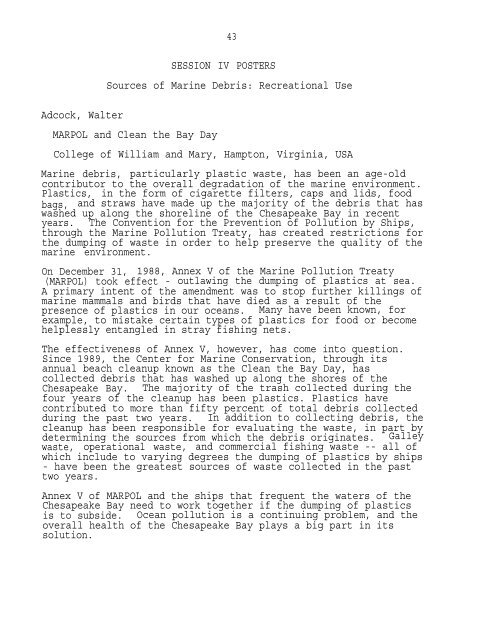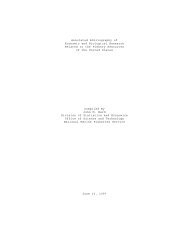Poster abstracts and manuscripts from the Third International ...
Poster abstracts and manuscripts from the Third International ...
Poster abstracts and manuscripts from the Third International ...
You also want an ePaper? Increase the reach of your titles
YUMPU automatically turns print PDFs into web optimized ePapers that Google loves.
Adcock, Walter<br />
43<br />
SESSION IV POSTERS<br />
Sources of Marine Debris: Recreational Use<br />
MARPOL <strong>and</strong> Clean <strong>the</strong> Bay Day<br />
College of William <strong>and</strong> Mary, Hampton, Virginia, USA<br />
Marine debris, particularly plastic waste, has been an age-old<br />
contributor to <strong>the</strong> overall degradation of <strong>the</strong> marine environment.<br />
Plastics, in <strong>the</strong> form of cigarette filters, caps <strong>and</strong> lids, food<br />
bags, <strong>and</strong> straws have made up <strong>the</strong> majority of <strong>the</strong> debris that has<br />
washed up along <strong>the</strong> shoreline of <strong>the</strong> Chesapeake Bay in recent<br />
years. The Convention for <strong>the</strong> Prevention of Pollution by Ships,<br />
through <strong>the</strong> Marine Pollution Treaty, has created restrictions for<br />
<strong>the</strong> dumping of waste in order to help preserve <strong>the</strong> quality of <strong>the</strong><br />
marine environment.<br />
On December 31, 1988, Annex V of <strong>the</strong> Marine Pollution Treaty<br />
(MARPOL) took effect - outlawing <strong>the</strong> dumping of plastics at sea.<br />
A primary intent of <strong>the</strong> amendment was to stop fur<strong>the</strong>r killings of<br />
marine mammals <strong>and</strong> birds that have died as a result of <strong>the</strong><br />
presence of plastics in our oceans. Many have been known, for<br />
example, to mistake certain types of plastics for food or become<br />
helplessly entangled in stray fishing nets.<br />
The effectiveness of Annex V, however, has come into question.<br />
Since 1989, <strong>the</strong> Center for Marine Conservation, through its<br />
annual beach cleanup known as <strong>the</strong> Clean <strong>the</strong> Bay Day, has<br />
collected debris that has washed up along <strong>the</strong> shores of <strong>the</strong><br />
Chesapeake Bay. The majority of <strong>the</strong> trash collected during <strong>the</strong><br />
four years of <strong>the</strong> cleanup has been plastics. Plastics have<br />
contributed to more than fifty percent of total debris collected<br />
during <strong>the</strong> past two years. In addition to collecting debris, <strong>the</strong><br />
cleanup has been responsible for evaluating <strong>the</strong> waste, in part by<br />
determining <strong>the</strong> sources <strong>from</strong> which <strong>the</strong> debris originates. Galley<br />
waste, operational waste, <strong>and</strong> commercial fishing waste -- all of<br />
which include to varying degrees <strong>the</strong> dumping of plastics by ships<br />
- have been <strong>the</strong> greatest sources of waste collected in <strong>the</strong> past<br />
two years.<br />
Annex V of MARPOL <strong>and</strong> <strong>the</strong> ships that frequent <strong>the</strong> waters of <strong>the</strong><br />
Chesapeake Bay need to work toge<strong>the</strong>r if <strong>the</strong> dumping of plastics<br />
is to subside. Ocean pollution is a continuing problem, <strong>and</strong> <strong>the</strong><br />
overall health of <strong>the</strong> Chesapeake Bay plays a big part in its<br />
solution.
















